A great garden leaves something to the imagination. It unfolds through time and space, with new discoveries waiting at each turn. Such a garden has mystery, intrigue and depth. Perhaps you would describe your garden as anything but this. By adding scrim, you can absolutely transform your garden and breathe new life into it.
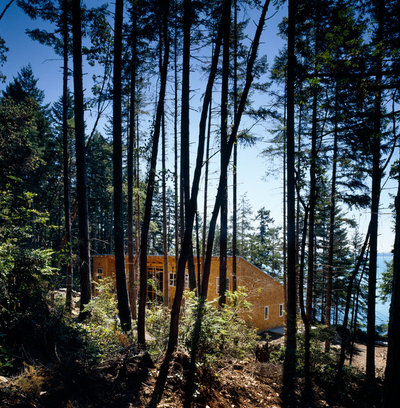 What is scrim?
What is scrim? Scrim is a light, gauzy fabric that is opaque until lit from behind. It can give a vignette a dreamy or foggy appearance when someone looks through it. Think of looking through sheer curtains from the interior of a house. Sheers add instant dimension to a scene because your eye acknowledges its presence while noticing the vignette beyond.
In the landscape, scrim can be anything opaque or loose enough in texture to be seen through. Like those sheer curtains, landscape scrim adds instant dimensionality or depth. It can even add a voyeuristic sense to the garden, because the viewer is looking through something to see something else. Intrigued? Let’s look at different types of scrim and how to effectively use them.
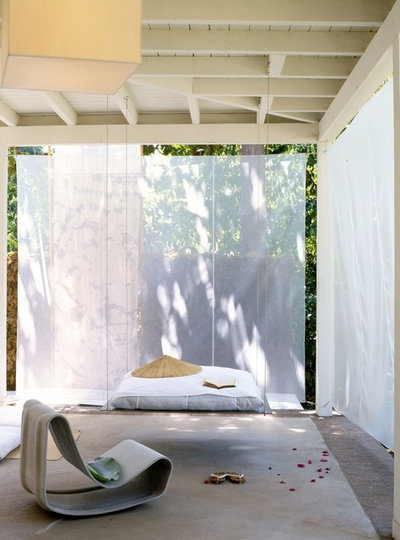
Rozalynn Woods Interior Design
Outdoor porch curtains create an indoor-outdoor connection. Hang sheer curtains made from outdoor fabric that is manufactured to stand up to the elements. Curtains of this type are reminiscent of mosquito netting, thereby adding a sense of the exotic.
Such curtains are a quick fix when privacy is needed on a porch. Typically, the porch is darker than the surrounding garden, so it is much easier to look out from the porch than to look in from the garden.
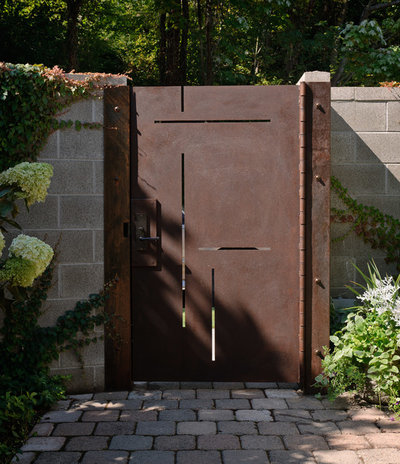
Castanes Architects PS
Garden gates can be the preface to your garden story. The entrance to your garden is a suitable beginning point for your use of scrim. After all, the entrance sets the tone for your space.
Gates with openings, such as this one, allow the visitor just a glimpse of what lies beyond while providing a large degree of privacy. If privacy is not a concern, the openings can be larger. Keep in mind, however, that you will not want to expose the entire view. The hidden parts are what add the feeling of seduction and mystery.
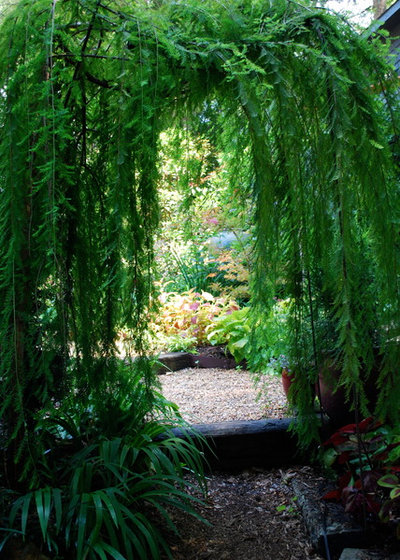
Jay Sifford Garden Design
Arbors add mystery by enticing the visitor. Instead of a bulky arbor marking the entrance to your garden or garden room, consider a looser arbor covered with a lacy or semitransparent plant. This Cascade Falls bald cypress (
Taxodium distichum ‘Cascade Falls’, USDA zones 4 to 9; find your zone) has fern-like foliage on pliable weeping branches. I enjoy parting the branches while walking through; they remind me of the strings of beads that hung from door frames in the 1960s and ’70s. The ability to conjure rich mental images is a mark of good garden design.
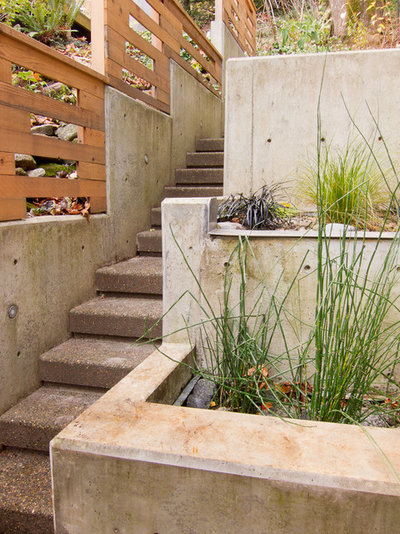
LANDline design
Use scrim fencing to highlight garden areas. Along with hedges, fences are the walls of your garden. Why not incorporate scrim into your walls to allow the visitor to see into the next garden room or to highlight a special vignette? The majority of your fence can still be solid to provide needed privacy. In fact, doing this will create mystery while directing the eye to a neighboring area. And where the eye goes, the body follows.
12 Delightfully Different Garden Walls and Fences
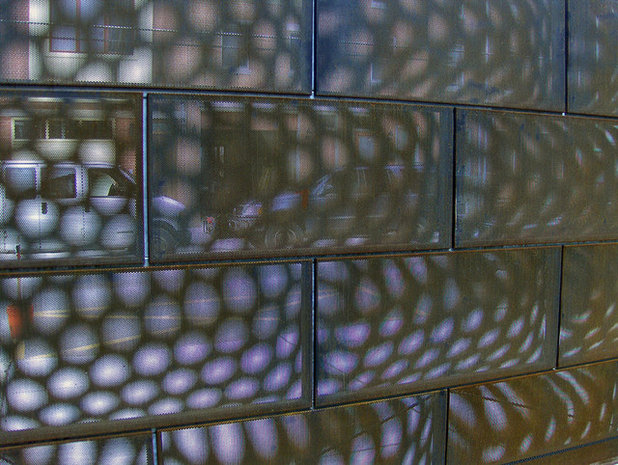
Bright Common Architecture & Design
Consider metal to add a contemporary vibe. Metals such as Cor-Ten steel, stainless steel and aluminum can be laser cut to create intricate and delicate patterns. Positioning the perforated screening in an area that is backlit can allow the projection of unique patterns. Such metal pieces provide privacy while still allowing air and light to penetrate — important aspects to consider in a garden setting.
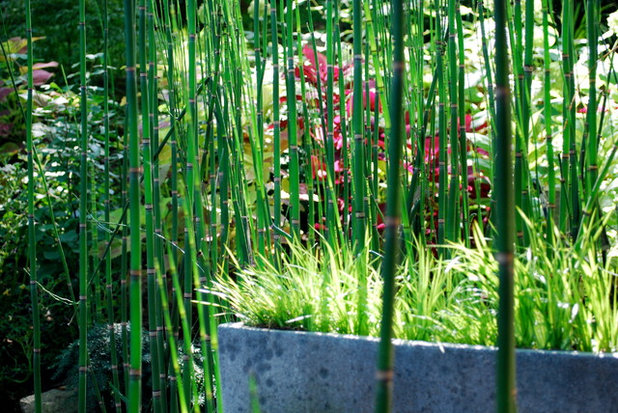
Jay Sifford Garden Design
Expand your plant palette to include scrim. Many plants can be thoughtfully used as scrim. This horsetail rush (
Equisetum hyemale, zones 3 to 11) sports hollow stems that become translucent when backlit by the sun. Such a vignette can set the garden aglow.
Note: Horsetail rush is considered invasive in many areas and is best planted in containers.
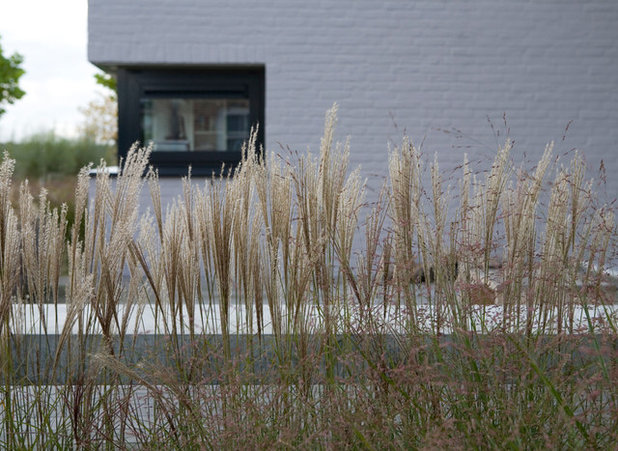
Studio TOOP
Incorporate ornamental grasses. Grasses are a prudent choice as scrim because many grasses, such as switchgrass (
Panicum spp and cvs, zones 2 to 9) and maiden grass (
Miscanthus sinensis, zones 5 to 9), attain heights of 4 to 7 feet. The highly textural and wispy growth habit of these grasses allows visitors to see through to a background vignette while adding depth and drama.
Browse ornamental grasses on Houzz
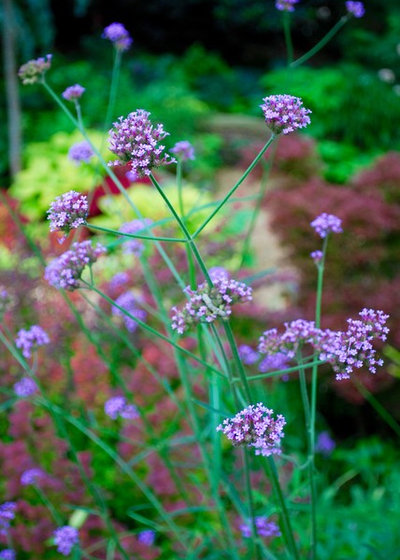
Jay Sifford Garden Design
Rethink flowering perennials. Perennials with a loose growth habit provide the perfect amount of scrim. This tall verbena (
Verbena bonariensis, zones 7 to 10), with its wiry stems, is one of the best. Its light purple flower heads entice and momentarily stop the eye before allowing it to move beyond to experience the rest of the garden. This plant can seed freely but is easily removed. In northern climates it can be planted as an annual.
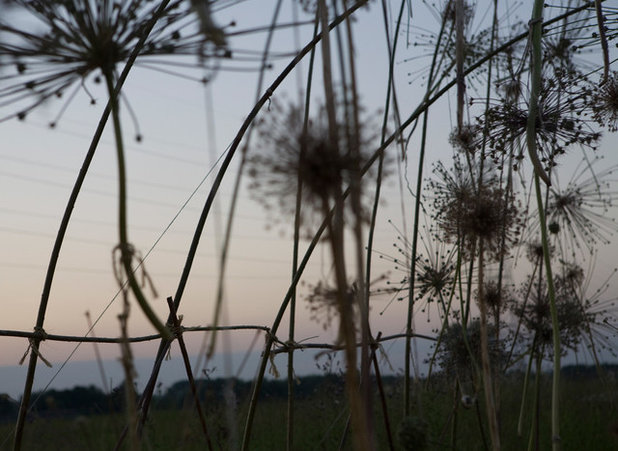
Studio TOOP
Plan for seasonal interest. Don’t be too quick to remove spent flower heads and to cut ornamental grasses in winter, as these dried and dead displays act as scrim and contrast the lush plants in the background. The allium heads shown here have a very somber, sculptural presence. Shorter plants can be elevated in containers or planted in raised beds surrounding a sunken seating area to increase their scrim value.
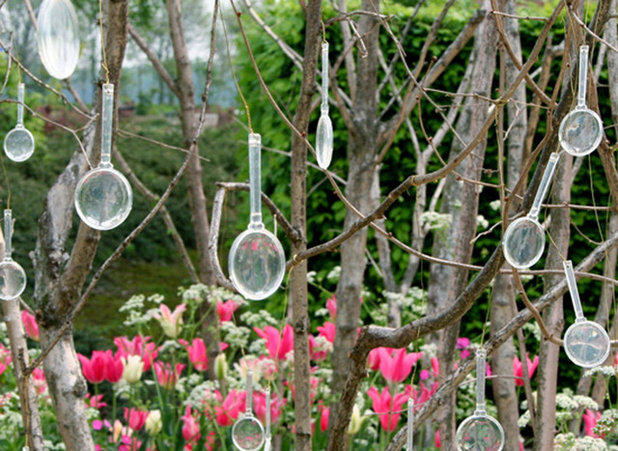
Studio TOOP
Add some garden bling. There are times when garden bling is appropriate. Shiny and reflective surfaces pull the eye toward them. Like jewelry, they can dress up a subdued garden vignette. The crystals and plastic pieces shown here dance in the breeze and captivate the eye before allowing it to move to the rest of the garden.
Caution: Consider any adverse effect on wildlife when choosing pieces.





